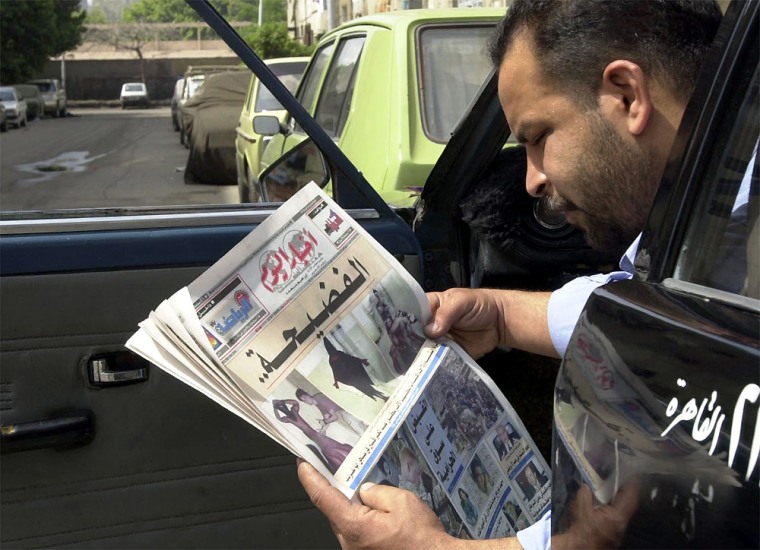Just when the credibility of the United States seems to have hit rock bottom in the Arab world, it has sunk even lower.
Arabs are not so much surprised as outraged by the images of U.S. abuse of Iraqi prisoners, graphic pictures of British troops allegedly beating and urinating on a prisoner, and now, the emergence of an internal U.S. military report acknowledging the occurrence of rape and sodomy at Abu Ghraib prison outside Baghdad.
For most Arabs, initially against the war, the symbolism of the pictures extends beyond the documented cases of abuse.
"It graphically encapsulates the humiliation of occupation, but it does not come as a surprise," said Gamal Nkrumah, foreign editor for the Egyptian publication Al Ahram Weekly. "In many people's minds, it confirms what they see the West as standing for: decadence, injustice. It reinforces the image of the brutal force of occupation.”
Many here, ready to believe the worst of U.S. and allied occupation forces, think such abuse is widespread. "People don't think for a minute it is a one-of-a-kind thing. They think it's symbolic of what has been going on,” Nkrumah said.
"These things happen in many places, and we know it," said journalism student May Hamdy.
Example of U.S. hypocrisy
Editorialists pointed to what they have long viewed as U.S. hypocrisy in its stated mission of bringing democracy to Iraq.
In an Al Ahram editorial titled "The Flavor of U.S. Freedom," Mohamed Sabrine wrote, "The Abu Ghraib 'accident' informs us of the flavor of American freedom and the kind of guarantees being given for the protection of human rights."
Arabs were quick to point with irony to the fact that the same prison was synonymous with torture under Saddam Hussein.
Al Arabiya, a popular Arabic satellite channel, introduced the pictures of a man draped in black and attached to electric wires with the title: "Replacing the Jailer?" asking, in effect, whether Iraq has traded one dictator for a new one.
"The U.S. and Britain rushed into the war declaring among other things that their aim was to bring democracy and freedom to the long suppressed Iraqis. The latest abuse grossly betrays this hypocrisy in the most despicable fashion," the Egyptian Gazette said in an editorial.
"The U.S. is ruining its image and it is hypocrisy. They are saying one thing and doing something else," said university student Sara Sami.
Assault on Arab world
Many see it as an assault not just on the dignity of the detainees concerned, but on the whole Arab and Muslim world.
"It brings [home] graphically the shame of being under occupation," Nkrumah said.
People expressed frustration at not being able to respond to the abuses. "I felt helpless," said mass communications student Noura Al Tahawy. "I refused to look at them first of all because it just sickens me that I have to tolerate this kind of thing."
Some say Arab governments must respond or the people will. "We are all really angry," Hamdy said. "Maybe if the government doesn't do something about it the people will."
If there is still a battle for hearts and minds, the United States has definitely lost this round.
The Al Ahram editorial warned, "If the U.S. will not awaken soon from its coma, it will become enemy No. 1 to the whole Arab and Islamic World."
Arab media have given the story maximum exposure. It has dominated the airwaves and the newspapers since Friday night, accompanied by interviews with analysts likening the actions of the guilty U.S. troops to those of the Ku Klux Klan and Iraqis saying they are worse off under the U.S. occupation than they were under Saddam.
Western and Arab media have sought out and interviewed detainees who have described their abuse at the hands of American troops.
"Editors, Arab newspapermen, media people, television, radio, would use these images to drive home the point that occupation is unacceptable, is ugly," Nkrumah said.
More manipulated photos may be next
And there is no end in sight to media coverage of a story that may have shocked American viewers but continues to validate the opinions of most Arab viewers.
In the absence of new documented pictures of abuse, an Egyptian opposition newspaper used uncorroborated ones.
On Tuesday, Al Wafd, a popular but not always reliable Egyptian newspaper, published four graphic pictures of what appear to be Western-looking men in military uniform raping women and forcing them to have oral sex.
The front-page banner read, "Democracy of the American Empire of Evil and Adultery: Mass Rape By the Soldiers of the Occupation of Iraqi Women Under Gunpoint."
The newspaper did not identify the source of the disturbing pictures and the editor in chief failed to return numerous phone calls inquiring after their authenticity.
Although it is difficult for Egyptians to find a bright side to the disturbing images from Abu Ghraib prison, some here hope that the current uproar will hasten the withdrawal of U.S. troops from Iraq.
